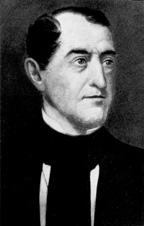
The 5th United States Congress was a meeting of the legislative branch of the United States federal government, consisting of the United States Senate and the United States House of Representatives. It met at Congress Hall in Philadelphia, Pennsylvania, from March 4, 1797, to March 4, 1799, during the first two years of John Adams' presidency. In the context of the Quasi-War with France, the Alien and Sedition Acts were passed by Congress. The Acts were overwhelmingly supported by the Federalists and mostly opposed by the Democratic-Republicans. Some Democratic-Republicans, such as Timothy Bloodworth, said they would support formally going to war against France but they opposed the Alien and Sedition Acts which Bloodworth and others believed were unconstitutional.

William Charles Cole Claiborne was an American politician, best known as the first non-colonial governor of Louisiana. He also has the distinction of possibly being the youngest member of the United States Congress in U.S. history, although reliable sources differ about his age.
Joseph Kerr was a Democratic-Republican politician from Ohio who served in the United States Senate.

William Cocke was an American lawyer, pioneer, and statesman. He has the distinction of having served in the state legislatures of four different states: Virginia, North Carolina, Tennessee, and Mississippi, and was one of the first two United States senators for Tennessee.

Ephraim Hubbard Foster was an American politician, who twice served as a United States Senator from Tennessee. During his political career, he was a member of the Whig Party.

Tilghman Ashurst Howard was an American lawyer, politician, and diplomat from Indiana. He was born near Easley, South Carolina. He moved to Knoxville, Tennessee, in 1816 and was admitted to the bar there in 1818. In 1830, he moved to Bloomington, Indiana, and in 1833 to Rockville, Indiana. President Andrew Jackson appointed him US Attorney for Indiana, and he served as such from 1833 to 1839. In 1838, he sought, unsuccessfully, to be elected to the U.S. Senate. He was elected to the United States House of Representatives on August 5, 1839, and served until he resigned on July 1, 1840.

The 1798–99 United States House of Representatives elections were held on various dates in various states between April 24, 1798 in New York and August 1, 1799 in Tennessee. Each state set its own date for its elections to the House of Representatives, with some after the official start of the 6th United States Congress on March 4, 1799, but before the start of the first session of this Congress in Philadelphia on December 2, 1799. These elections were held during President John Adams term. It was the last congressional session before the move to the new capital at Washington, D.C. Elections were held for all 106 seats, representing 16 states.

The 1796–97 United States House of Representatives elections took place in the various states took place between August 12, 1796, and October 15, 1797. Each state set its own date for its elections to the House of Representatives. The size of the House increased to 106 seats after Tennessee became the 16th state to join the union. The first session of the 5th United States Congress was convened on May 15, 1797, at the proclamation of the new President of the United States, John Adams. Since Kentucky and Tennessee had not yet voted, they were unrepresented until the second session began on November 13, 1797.
Julius W. Blackwell was an American politician and a member of the United States House of Representatives that represented fourth and third districts of Tennessee in the United States House of Representatives.

Richard Hawes Jr. was a United States representative from Kentucky and the second Confederate Governor of Kentucky. He was part of the politically influential Hawes family. His brother, uncle, and cousin also served as U.S. Representatives, and his grandson Harry B. Hawes was a member of the United States Senate. He was a slaveholder.

The 4th United States Congress was a meeting of the legislative branch of the United States federal government, consisting of the United States Senate and the United States House of Representatives. It met at Congress Hall in Philadelphia, Pennsylvania, from March 4, 1795, to March 4, 1797, during the last two years of George Washington's presidency. The apportionment of seats in the House of Representatives was based on the 1790 United States census. The Senate had a Federalist majority, and the House had a Democratic-Republican majority.
Events from the year 1796 in the United States.

The 1808–09 United States Senate elections were held on various dates in various states, coinciding with the 1808 presidential election. As these U.S. Senate elections were prior to the ratification of the Seventeenth Amendment in 1913, senators were chosen by state legislatures. Senators were elected over a wide range of time throughout 1808 and 1809, and a seat may have been filled months late or remained vacant due to legislative deadlock. In these elections, terms were up for the senators in Class 1.

The 1798–99 United States Senate elections were held on various dates in various states. As these U.S. Senate elections were prior to the ratification of the Seventeenth Amendment in 1913, senators were chosen by state legislatures. Senators were elected over a wide range of time throughout 1798 and 1799, and a seat may have been filled months late or remained vacant due to legislative deadlock. In these elections, terms were up for the senators in Class 2.

The 1796–97 United States Senate elections were held on various dates in various states. As these U.S. Senate elections were prior to the ratification of the Seventeenth Amendment in 1913, senators were chosen by state legislatures. Senators were elected over a wide range of time throughout 1796 and 1797, and a seat may have been filled months late or remained vacant due to legislative deadlock. In these elections, terms were up for the senators in Class 1.

Due to Vermont's election law requiring a majority to secure a congressional seat, the 1st district required three ballots to choose a winner.

The 1797 United States Senate election in Pennsylvania was held on February 16, 1797. Incumbent James Ross was re-elected by the Pennsylvania General Assembly to the United States Senate.

Elections in Tennessee are held to fill various local, state, and federal seats. Special elections may be held to fill vacancies at other points in time. Statewide legislative referrals and referendums may also be on the ballot in some elections. Tennessee is one of thirteen states that holds its presidential primaries on Super Tuesday.















